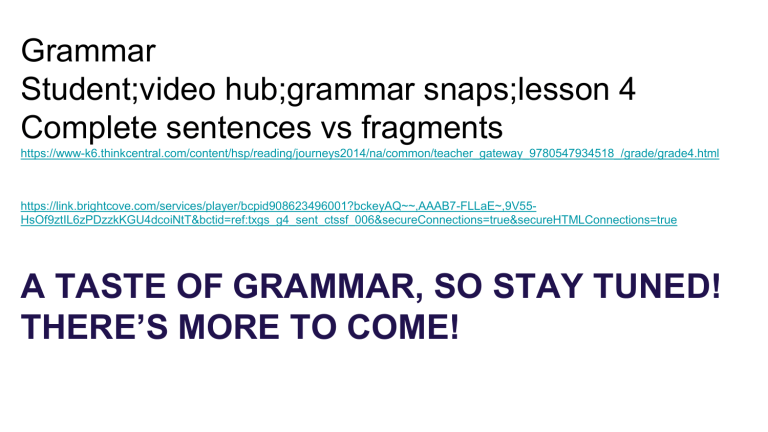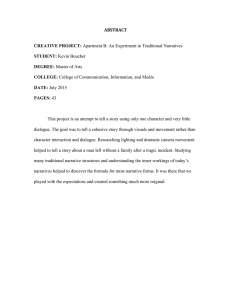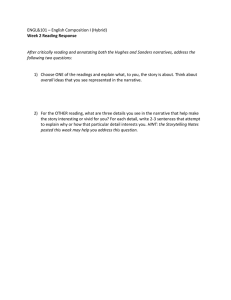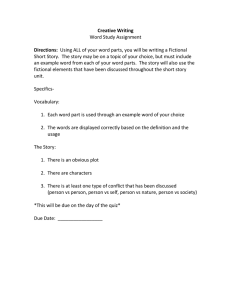
Grammar Student;video hub;grammar snaps;lesson 4 Complete sentences vs fragments https://www-k6.thinkcentral.com/content/hsp/reading/journeys2014/na/common/teacher_gateway_9780547934518_/grade/grade4.html https://link.brightcove.com/services/player/bcpid908623496001?bckeyAQ~~,AAAB7-FLLaE~,9V55HsOf9ztIL6zPDzzkKGU4dcoiNtT&bctid=ref:txgs_g4_sent_ctssf_006&secureConnections=true&secureHTMLConnections=true A TASTE OF GRAMMAR, SO STAY TUNED! THERE’S MORE TO COME! UNIT 1: LESSON 4 WEEK OF AUGUST 26-30 SPELLING Short o and Long o 1) block 11) throat 2) shown 12) host 3) oatmeal 13) online 4) wrote 14) shock 5) fellow 15) solve 6) scold 16) Long o Ow as in fellow CVCe as in wrote Oa as in coast Short o CVC as in block Spelling pattern sort: stock host coast known slope INTONATION: the rise and fall of the voice in speaking. Good readers raise and lower the pitch of their voices to show things such as the beginning of a new sentence or to indicate that they are asking a question. Intonation helps listeners to understand how characters feel and to keep track of ideas and events. TEACHER READ ALOUD “Bookmobile Rescue” Vocabulary: assist misjudged suspect innocent favor speculated burglaries scheme FICTIONAL NARRATIVES INTRODUCTION: FICTIONAL NARRATIVE: ● It is an imaginative story about characters who solve a problem. ● The beginning introduces the setting, the characters, and the problem in an interesting way. ● In the middle of the story, the plot events show how the characters deal with the problem. Events are usually told in chronological order. Chronological order is the order in which things happened. ● The climax, which takes place near the end, is the most exciting point at which the problem is solved. LET’S EXPLORE VARIOUS TYPES OF FICTIONAL NARRATIVES! https://wwwk6.thinkcentral.com/content/hsp/reading/journeys2017/re sources/interactive_lessons/gr4/writing_narratives_introd uction/index.html Anchor text: “The Power of W.O.W.” Authors write stories and plays to entertain, but most also want their reading audience to come away with an important message. This message is called the THEME. Authors rarely state the theme directly, but instead reveal it through details about the setting, characters, and the characters’ actions. By looking closely at these elements, the audience can infer, or figure out, the theme. Notice the inference map on page 108 in your book. You will use a similar chart to record the story elements in the play, “The Story of W.O.W." ***REMEMBER*** ● Subject (noun/pronoun) - the part of a sentence that tells who or what is doing the action ● Predicate (verb) - the part of the sentence that tells what action is being done A fragment does not tell a complete thought. It is missing a subject, a verb, or both. What is missing from each fragment? A subject (noun/pronoun) or a predicate (verb)? 1. Sat under the tall oak tree. 2. The three brown squirrels. 3. Some slimy salamanders. 4. Eating algae off the rocks. 5. Hedgehogs from the zoo. 6. Rolling into a prickly ball. Reader’s notebook page 43 Independent practice with sentence fragments Tuesday Before we reread “The Power of W.O.W.!” let’s review a few terms. Rehearsal Time! We will choral read page 117, using the punctuation to guide our intonation. Our intonation will help reflect the ideas and emotions of the dialogue. *LET’S READ IN A NORMAL VOLUME AND STAY TOGETHER LET’S REREAD: “THE POWER OF W.O.W.!” Analyze the text: pg. 113, pg. 116-117, (teacher pgs. T249, T253, T257). Your turn: pg. 124 ● Turn and Talk ● Classrom Conversation pg.121 DAILY PROOFREADING PRACTICE: 1. Can’t find her pen. 2. My favorite color. You Do: Reader’s NB p.44 The writing focus: Writers introduce the plot of a narrative at the beginning of the text. This tells the reader the main problem in the narrative and why it matters to the characters. From there, the text is organized around the steps towards how the characters solve the problem. Writers sometimes state the reasons for events or action and other times they just give hints, expecting the reader to figure out the reasons. For instance” Instead of this: The author wrote this: of it. Ileana really enjoyed coming to W.O.W. I have some money saved. You can have it - all Readers Notebook: pg.48



